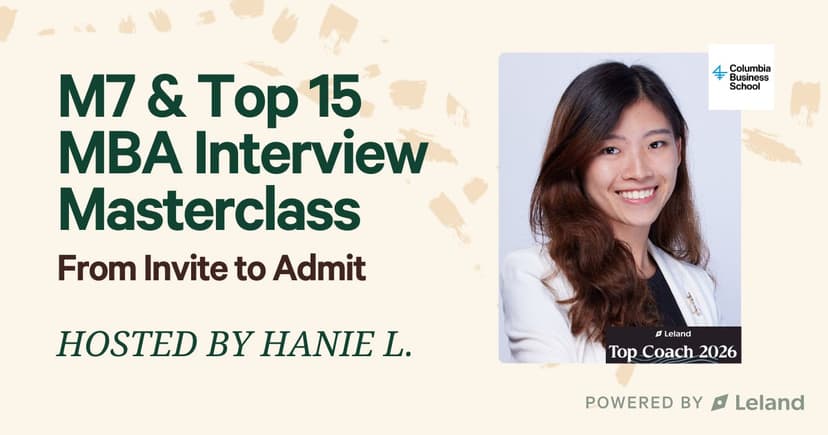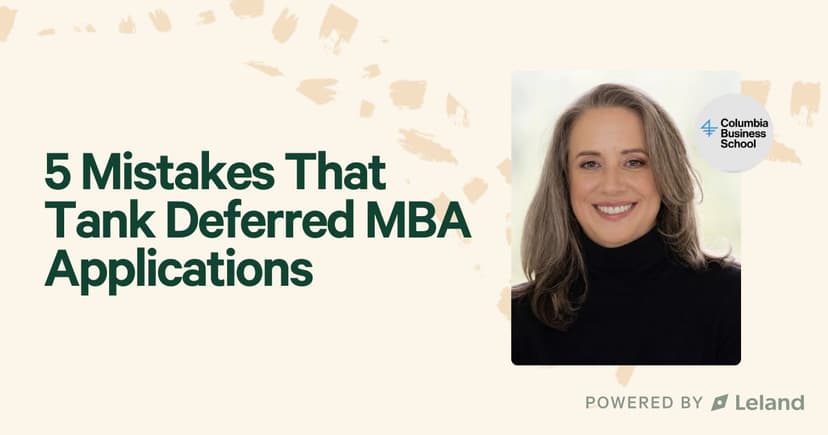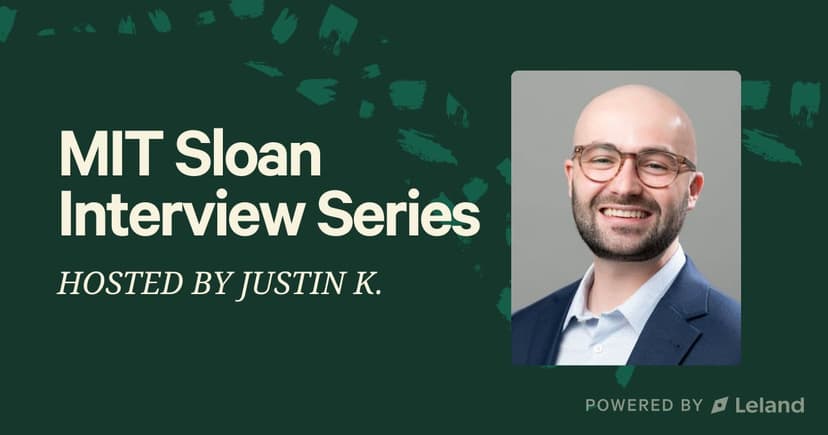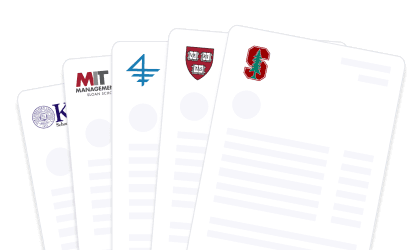M7 & Top 15 MBA Interview Masterclass: From Invite to Admit
MBA Recommender Questions and Criteria for the Top 10 Business Schools
Get the best letters of recommendation possible by learning what specific questions your MBA recommenders will be asked as well as what kind of recommenders the top 10 business schools require applicants to have.
Posted June 13, 2025

Join a free event
Learn from top coaches and industry experts in live, interactive sessions you can join for free.
Table of Contents
The MBA letters of recommendation are a crucial component of your application. Admissions officers highly regard reference letters as they provide an independent perspective on your candidacy. The rest of the application – resume, essays, GPA, test scores, etc. – are all from you, the applicant. The letters of recommendation can be seen as a testimonial of your skills, qualities, and trajectory from someone who is not you.
The letters of recommendation are the only part of the application process that is not directly within the applicant's control. The individuals you select to provide these recommendations, the quality of their writing, the relevance of the examples they provide, and their credibility all play significant roles in determining the strength of your application.
To ensure that your letters of recommendation are as strong as possible, it's important to adequately prepare and support your recommenders, providing them with everything they need to portray you positively. Though you don’t have direct control over the letters, you can have more influence than you may think.
Read: How to Get the Perfect MBA Letter of Recommendation–With Examples
Who Can Be a Recommender for an MBA Application?
A good recommender for an MBA application is someone who knows you well and can speak to your qualifications, work ethic, and leadership abilities. This person could be a current or former supervisor, a colleague, or a professional mentor who has observed your professional or academic performance. Many applications strongly recommend that at least one of the recommenders be a current direct supervisor or the next best alternative.
It's important that the recommender can provide specific examples and details that demonstrate your skills and potential for success in a graduate business program. Additionally, a good recommender should be able to highlight your accomplishments and attributes that align with the values and culture of the MBA program to which you are applying.
Create a Recommender Prep Doc
At Leland, we highly recommend that you provide recommender prep docs to your recommenders. This packet includes the schools you’re applying to along with their deadlines, the questions they’ll be asked, and specific examples from your work with them. This will help your recommenders write powerful and specific letters.
Including the actual questions your recommenders will be asked is crucial, as it allows them time to think about their responses and enables you to provide tailored examples.
We have compiled all of the questions that the top 10 business schools ask their applicants' recommenders to help you create these prep documents and obtain excellent letters of recommendation.
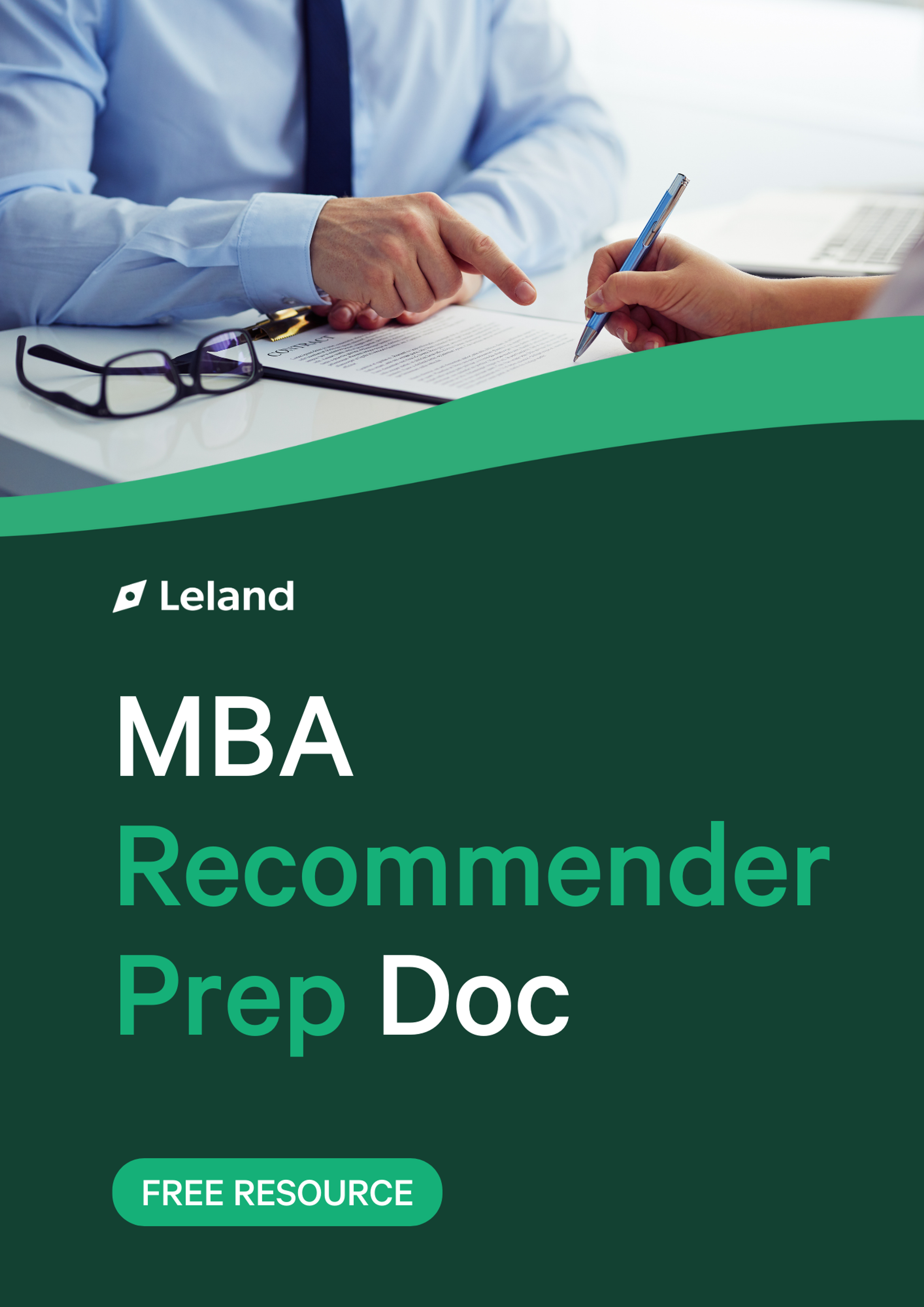
MBA Recommender Prep Doc & Example
Download our free recommender prep doc used by thousands of applicants to get the strongest possible letters of rec
1. Stanford GSB
Stanford’s LOR process involves two steps: first, recommenders will assess the applicant based on key character traits, then they’ll answer three questions. Each trait has a scale from one to five and the recommender will check the box that most applies. They include:
- Initiative
- Results Orientation
- Communication, Professional Impression, and Poise
- Influence and Collaboration
- Respect for Others
- Team Leadership
- Developing Others
- Trustworthiness/Integrity
- Adaptability/Resilience
- Self-Awareness
- Problem-Solving
- Strategic Orientation
The letter itself should include answers to these three questions:
- How does the applicant’s performance compare to that of other well-qualified individuals in similar roles? Please provide specific examples (e.g., what are the applicant’s principal strengths?) (500 words max.)
- Describe the most important piece of constructive feedback you have given the applicant. Please detail the circumstances and the applicant’s response. (500 words max.)
- (Optional) Is there anything else we should know? Please be concise.
GSB Recommender Criteria
Stanford recommends that the first recommender should be a current direct supervisor or the next best alternative. The second recommender should be someone else who has supervised you. The GSB states that the strongest recommendation letters are usually those from a workplace and that having both recommenders come from the same organization is fine. If you’re a deferred applicant, you should still try to find recommenders who have supervised you, such as in extracurricular activities, internships, or part-time jobs.
2. Harvard Business School
HBS asks recommenders to fill out a qualities and skills grid and then answer the following two questions.
- How do the candidate's performance, potential, background, or personal qualities compare to those of other well-qualified individuals in similar roles? Please provide specific examples. (300 words max.)
- Please describe the most important piece of constructive feedback you have given the applicant. Please detail the circumstances and the applicant's response. (250 words)
HBS Recommender Criteria
Harvard doesn’t set any specific recommender requirements and instead says that applicants should “find people who know [them] well enough to answer [the questions]. This can be a former supervisor, a colleague, or someone you collaborated with on an activity outside of work.” As with all recommenders, how well they know the applicant should always take precedence over the level of seniority.
3. University of Pennsylvania Wharton
Like GSB and HBS, Wharton also asks for a personality assessment but does so differently. They ask recommenders to choose two characteristics from a list of ten that best describe the candidate. Then, they’ll answer two questions.
- Please provide an example(s) that illustrate why you believe this candidate will find success in the Wharton MBA classroom. (300 words max.)
- Please provide an example(s) that illustrate why you believe this candidate will find success throughout their career. (300 words max.)
Wharton Recommender Criteria
Wharton recommends that the two recommenders be people who are familiar with the applicant’s performance in a work setting, preferably a current or former supervisor.
4. University of Chicago Booth
Chicago Booth recommenders will need to fill out a skills assessment and then answer two questions.
- How do the applicant's performance, potential, background, or personal qualities compare with those of other well-qualified individuals in similar roles? Please provide specific examples.
- Please describe the most important piece of constructive feedback you have given the applicant. Please detail the circumstances and the applicant's response.
Booth Recommender Criteria
Booth requires at least one recommendation letter to come from a supervisor. While they prefer that it’s a current one, they understand that this isn’t always possible. If the applicant is not able to get a recommendation from a current supervisor, they should explain why in the optional essay. The other letter can come from another professional contact or someone who worked with them in an organization, club, or volunteer setting.
5. Northwestern University Kellogg
Kellogg’s letters of recommendation include the following three questions:
- Kellogg has a diverse student body and values students who are inclusive and encouraging of others with differing perspectives and backgrounds. Please tell us about a time when you witnessed the candidate living these values. (300 words max.)
- How does the candidate's performance compare to other well-qualified individuals in similar roles? Please provide specific examples. (300 words max.)
- Describe the most important piece of constructive feedback you have given the candidate. Please detail the circumstances and the applicant's response. (250 words max.)
Kellogg Recommender Criteria
Ideally, Kellogg desires one of the recommenders to be a current supervisor or manager. The second should come from someone who is acquainted with the applicant’s professional performance and leadership potential. The Associate Director of Admissions, Emily Stevens, adds that the people who write these letters should be those who have seen the impact that the applicant has made on the organization.
6. MIT Sloan
MIT Sloan utilizes the GMAC Common Letter of Recommendation which includes these three questions.
- Please provide a brief description of your interaction with the applicant and, if applicable, the applicant’s role in your organization. (Recommended word count: 50 words)
- How does the performance of the applicant compare to that of other well-qualified individuals in similar roles? (e.g., what are the applicant’s principal strengths?) (Recommended word count: 500 words)
- Describe the most important piece of constructive feedback you have given the applicant. Please detail the circumstances and the applicant’s response. (Recommended word count: 500 words)
Sloan Recommender Criteria
Sloan only accepts one letter of recommendation. It should be from a professional contact, ideally a manager or supervisor.
7. Columbia Business School
Columbia has two questions for the recommender and one additional one for deferred applicants. The recommended total limit for the letter is 1000 words.
- How do the candidate's performance, potential, background, or personal qualities compare to those of other well-qualified individuals in similar roles? Please provide specific examples.
- Please describe the most important piece of constructive feedback you have given the applicant. Please detail the circumstances and the applicant's response.
Additional question for the deferred enrollment program:
- Please share how you feel the applicant will contribute to the Columbia Business School classroom and community.
Columbia Recommender Criteria
Columbia applicants who are applying for the first time only need to submit one recommendation. If they have been working for at least six months, the letter should come from a current supervisor; if that’s not possible, the applicant should explain in the Employment section of the application. Other good choices for recommenders include former direct supervisors or other professional, more senior associates.
8. New York University Stern
Rather than traditional letters of recommendation, Stern asks for an EQ endorsement. You must submit one EQ Endorsement. The second EQ Endorsement is optional.
The evaluators must rate the applicant’s abilities/qualities and answer five specific questions. These questions are as follows:
- Please provide a brief description of your interaction with the applicant and, if applicable, the applicant's role in your organization.
- How does the applicant's performance compare to that of other well-qualified individuals in similar roles (if applicable)? Please provide specific examples. (E.g. what are the applicant's principal strengths?)
- Describe the most important piece of constructive feedback you have given the applicant. Please detail the circumstances and the applicant's response.
- IQ+EQ is a core value of NYU Stern, and we seek exceptional individuals who possess both intellectual and interpersonal strengths. Emotional intelligence (EQ) skills such as self-awareness, empathy, communication, and self-management are at the core of our community of leaders. Please provide one specific and compelling example to demonstrate the applicant's emotional intelligence.
- (Optional) Is there anything else we should know?
Stern Recommender Criteria
Stern requires the first evaluation to come from a direct supervisor. If this is not possible, the applicants should explain the application. The second one can come from anyone who knows the applicant professionally and/or personally. Stern recommends that applicants choose recommenders who can objectively assess their potential for success in the MBA program and their future careers. While more than two evaluations are allowed, they are not encouraged.
9. Dartmouth Tuck
Tuck follows the GMAC Common Letter of Rec and as such, asks these four questions.
- Please provide a brief description of your interaction with the applicant and, if applicable, the applicant’s role in your organization. (50 words)
- How does the performance of the applicant compare to that of other well-qualified individuals in similar roles? (E.g. what are the applicant’s principal strengths?) (500 words)
- Describe the most important piece of constructive feedback you have given the applicant. Please detail the circumstances and the applicant’s response. (500 words)
- Optional: Is there anything else we should know?
Tuck Recommender Criteria
Tuck, like the other programs on this list, requires one reference letter to come from a current supervisor. If that’s not possible, an explanation will be expected. Academic references that don’t have experience with the applicant’s professional work are not recommended. Tuck suggests that you find recommenders who can demonstrate that you are “smart, accomplished, aware, and encouraging.”
10. UC Berkeley Haas
Haas has its applicants’ recommenders complete a skills/qualities grid as well as a written assessment that addresses the following five prompts.
- Please provide a brief description of your interaction with the applicant and, if applicable, the applicant's role in your organization.
- How does the applicant’s performance compare to that of other well-qualified individuals in similar roles? Please provide specific examples.
- Describe the most important piece of constructive feedback you have given the applicant. Please detail the circumstances and the applicant’s response.
- In the Berkeley MBA program, we develop leaders who embody our distinctive culture’s four key principles one of which is “Confidence Without Attitude” or “confidence with humility.” Please comment on how the applicant reflects this Berkeley Haas value.
- (Optional) Is there anything else we should know?
The specific qualities that Haas asks the recommenders to rate the applicant on are:
- Results Orientation
- Strategic Orientation
- Team Leadership
- Influence and Collaboration
- Communication
- Information Seeking
- Developing Others
- Change Leadership
- Respect for Others
- Trustworthiness
Haas Recommender Criteria
Berkeley requires two recommenders, one of which preferably comes from a current employer. The program stresses that their title/status is not important. Applicants should choose people who know them and have worked with them closely and can attest to their value, accomplishments, and skills. Do not choose a coworker, supervisee, relative, or friend. Haas will not accept more than two letters.
Where Can I Start?
When planning to apply to business school, we recommend starting to cultivate relationships with potential recommenders as early as possible. Also, note the characteristics that the school is looking for and make sure to develop and then demonstrate them where you can.
Express Gratitude with a Thank You Note
Don't forget to send a thank you note to your recommenders! Showing gratitude by sending a note two weeks before the deadline is a thoughtful gesture. It's also a gentle reminder for them to send the letter if they haven't already. A well-crafted thank-you note is a small effort that can make a big difference in maintaining positive relationships with your recommenders.
Additional MBA Resources
In the meantime, take advantage of the recommender prep doc by putting your email in the form above. It is Leland coach-approved and has been proven to help applicants receive effective recommendation letters.
Additionally, collaborate with a Leland coach to finalize your application. They can assist with preparing your recommender documents. Below are some of our top-rated MBA admissions coaches.
Also, here are a couple of articles you may find useful as you go through the application process:
- How to Get the Perfect MBA Letter of Recommendation-With Examples
- How to Write a Powerful MBA Essay–With Examples
- How to Craft the Ultimate MBA Resume–With Examples
- Top 50+ Free Resources for GMAT & GRE Practice
- How to Get Started on Your Letters of Recommendation for Graduate School
Finally, we strongly recommend enrolling in Leland. By doing so, you will gain access to extra resources and guides, receive discount codes for coaching, have priority in signing up for classes and free events, join an exclusive community of like-minded and ambitious individuals, and enjoy many other benefits. We’re here to help you get into your dream MBA program!
FAQs
What should an MBA letter of recommendation include?
- It should highlight your leadership, teamwork, communication, and problem-solving skills with specific examples from professional settings.
How many letters of recommendation do you need for an MBA?
- Most top MBA programs require two letters, typically from current or recent supervisors who can speak directly to your work performance.
What are the 6 details that should be included in a letter of recommendation?
- Key details include the recommender’s relationship to the applicant, length of time they've worked together, key strengths, specific examples, comparison to peers, and a summary endorsement.
Who are good references for MBA?
- Strong references include current or former managers, senior colleagues, or clients who have directly observed your leadership and impact in a work setting.




